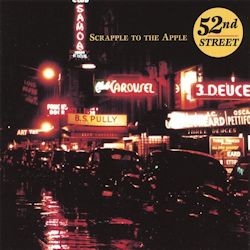 BUY NOW AmazonUK AmazonUS |
52nd Street – Scrapple to the Apple Wendy Simon (vocals): Eric Shae (piano, vocals): Tony Williams (alto sax, flute): Craig Thomas (bass): Tony Green (drums)
Recorded March 1985 at Calssic Studio, NYC INNER CITY RECORDS IC 1165 [39:40]
|
Take the “A” TrainOh-Shoo-Be-Doo-Be
Love: Webster’s Definition
Everybody Eats When They Come To My House
Miss Harper Goes Bizarre
Jumpin’ with Symphony Sid
Everybody’s Boppin
Today You Are Born In My Eyes
My Favorite Things
Coconut Grove
I’ve Got Just About Everything
This was 52nd Street’s only LP, released back in 1985 and now reissued as one of Inner City’s nicely produced restorations. The eleven tracks pay tribute to the long-lasting influence on the group of Lambert, Hendricks and Ross rather more than a vocalese-scat virtuoso such as Eddie Jefferson – who’s also represented on Inner City’s books – and does so in a way that generates real impetus, swing and, crucially, wit.
The vocals are by Wendy Simon and Eric Shaw and Shaw also takes on piano duties, leading the ensemble nimbly. The swingingly hip ethos makes itself clear as early as Strayhorn’s Take the “A” Train where Tony Williams’ keen alto solo adds its own nimble voice to the ensemble. Springy rhythmic backing underpins the success of the session, essential if a vocalese staple like Oh-Shoo-Be-Doo-Be is to hit the mark, which it does here in a sexy reworking of the original. There are two articulate and thoughtful songs by Bob Dorough, the first being Love: Webster’s Definition with elegant piano statements, sinuous bass lines and supple drumming; the lyrics are quietly melancholic. An ethos of ‘See Ya Later Alligator’ hangs over Everybody Eats When They Come To My House only the focus is very much on Cab Calloway-era food consumption – the kind of thing Louis Jordan might later have done.
The blues-drenched lyrics of Ray Passman and Meredith d’Ambrosio’s Miss Harper Goes Bizarre expand the album’s reach still further whilst Williams returns and appropriately so for the Lester Young-King Pleasure classic Jumpin’ with Symphony Sid. The fast and furious tongue-twisting version of Jon Hendricks’ Everybody’s Boppin allows taut scat fireworks from Simon and Shaw though it’s Simon on her own in the tender ballad Today You Are Born In My Eyes. I’m not sure Richard Rogers and Oscar Hammerstein would look quite so benignly on this version of My Favorite Things, given the things done to their lyrics, but lyric-bending is something that tends to be the province of scat and vocalese singers. For variety one can hear Williams’ flute in Coconut Grove.
The booklet prints the entire lyrics of the songs in attractively laid out fashion. This is a great restoration of a fine album. What a pity the group didn’t go on to other things together. Their ensemble was tight, had sufficient variety of sound, and their songs mixed bop standards with some thoughtful newer material.
Jonathan Woolf